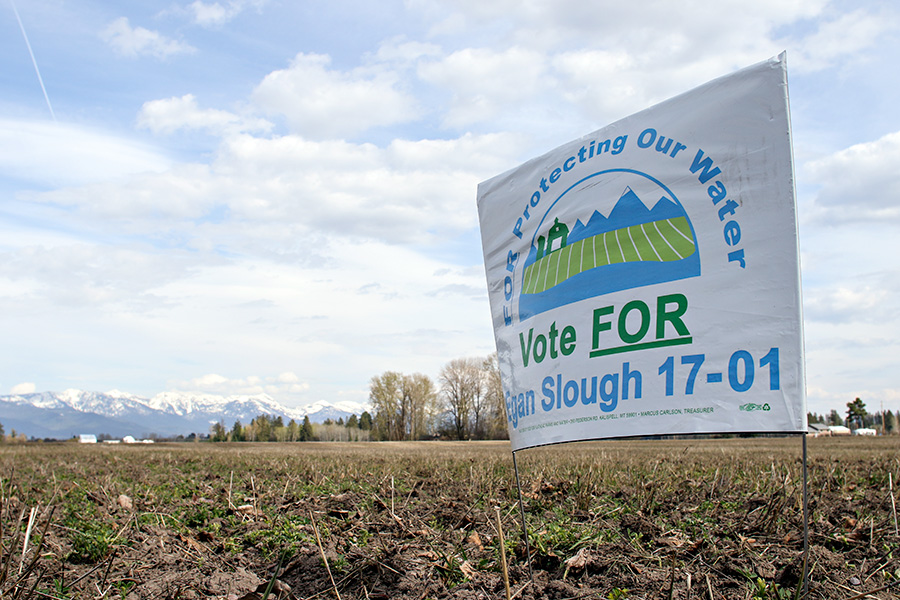Judge: Zoning District Barring Water-Bottling Plant is Lawful
Ballot initiative prohibiting industrial uses on Egan Slough survives final legal challenge
By Tristan Scott
A ballot measure that places side rails on allowable land uses along Egan Slough in the Creston area, including at a nearby water-bottling plant that produces and sells artesian water, is a legally enforceable initiative, according to a Dec. 15 ruling by Flathead County District Judge Robert B. Allison.
The final ruling comes as a decisive victory to plaintiffs who have pushed back against the bottling project near Flathead Lake through various legal channels, including the citizen-driven ballot initiative to expand the Egan Slough Zoning District created in 2002 as a way to preserve the land’s agricultural character. The zone prohibits most industrial uses, including the bottling plant, which is situated within the initiative’s newly expanded boundaries.
In 2018, litigation over the validity of the initiative began when the Egan Slough Community, Yes! For Flathead Farms and Water and resident Amy Waller filed suit against the Flathead County Commission, the Flathead County Planning Department, the Flathead City-County Health Department, and the Montana Artesian Water Company (MAWC).
Over the course of the litigation, the court has ruled that the initiative is legal; that it cannot be considered “reverse spot zoning; and that it did not constitute the “taking” of a private property interest under the state’s constitution.
“We are very pleased with this ruling, and grateful for the immense amount of effort the court has spent on this case,” Waller stated in a press release.
MAWC argued the new zoning district is illegal on several fronts, including because it adversely impacts landowners within the district and fails to comply with statutory requirements.
Allison’s orders have held that Initiative 17-01, which was approved by 70% of Flathead County voters on June 5, 2018, was fair and lawfully enacted and serves the public interest. His most recent order recognized that the zoning addition serves to “preserve the rural nature of the property, limit commercial activity, protect natural resources such as water, clean air and noise, emphasize the self governance principle at the heart of an initiative, impose restrictions on the subdivision of property.”
Controversy over the bottling project began as soon as MAWC’s owner, Creston landowner Lew Weaver, applied for permits from the state Department of Environmental Quality (DEQ) and Department of Natural Resources and Conservation (DNRC).
Weaver received a permit with the DNRC that would allow his company to produce up to 140,000 water bottles per hour, 24 hours a day, seven days a week. The water right would allow Weaver’s company to receive 710 acre feet of water annually, equaling roughly 1.2 billion 20-ounce water bottles.
The ballot initiative added 530 acres to the existing 1,150 acres in the zone, including Weaver’s facility, which, under the zoning district, is in violation of the district’s regulations.
Attorneys for MAWC moved for summary judgment in the case, saying the ballot initiative was illegal on six independent bases, including that it impacts a small fraction of county residents, even though it was put up for a county-wide vote.
Allison’s most recent ruling against MAWC resolves all remaining legal issues regarding Initiative 17-01.
An attorney for MAWC did not immediately respond for a comment on the order, but according to the company’s website its water-bottling operation located “just downstream from Glacier National Park” continues to operate as it navigates still-pending litigation over permitting through the DNRC.